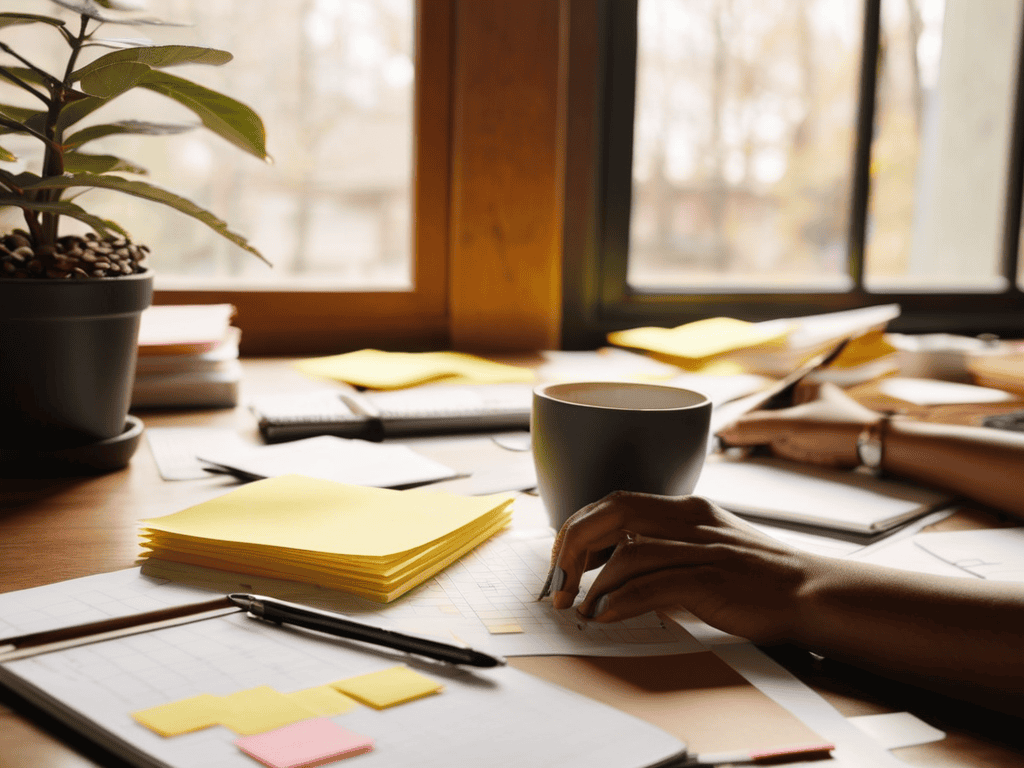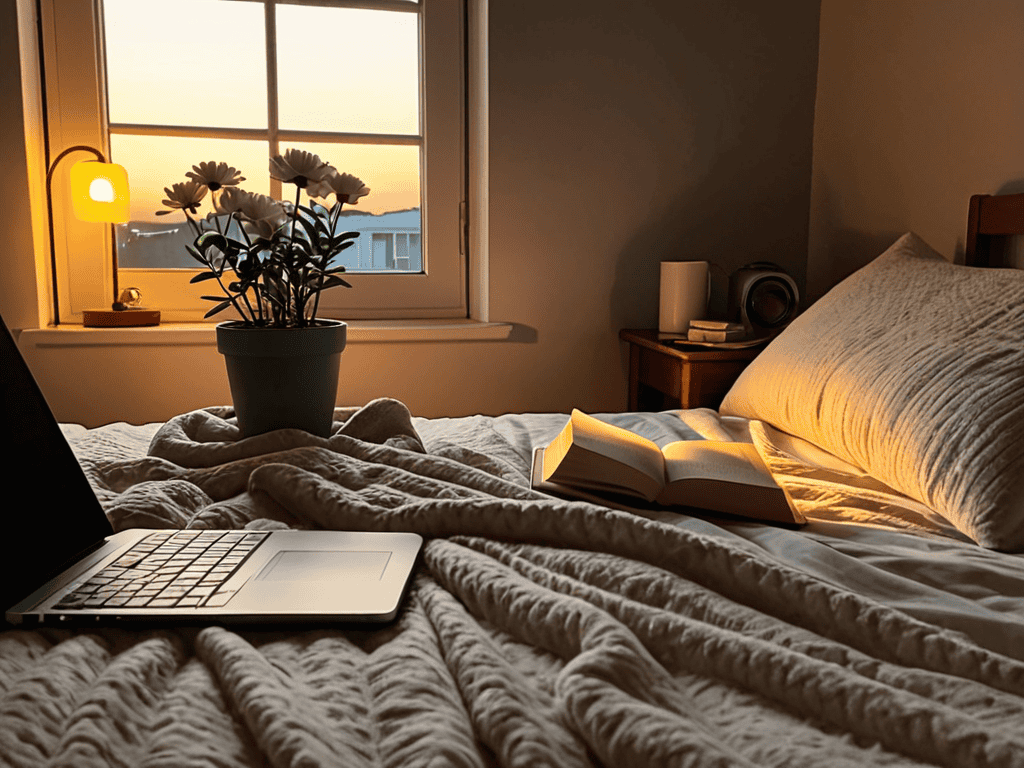I still remember the day I realized that feeling guilty about taking a break was not only exhausting, but also completely unnecessary. I was stuck in a cycle of constant productivity, always pushing myself to do more, and never allowing myself to truly relax. But as I searched for ways to overcome productivity guilt and enjoy my downtime, I discovered that it’s not about being lazy or unproductive, it’s about finding a healthy balance. The common myth that we need to be constantly working to be successful is not only misleading, but also damaging to our mental and physical health. In reality, learning how to overcome productivity guilt and enjoy your downtime is essential for maintaining our well-being and achieving our goals.
As you read this article, you’ll discover practical tips and strategies for overcoming productivity guilt and making the most of your downtime. You’ll learn how to reframe your mindset, prioritize self-care, and create a schedule that works for you, not against you. You’ll also find out how to silence your inner critic and focus on what truly matters. By the end of this article, you’ll have a clear understanding of how to enjoy your downtime without feeling guilty, and how to use that time to recharge and come back stronger than ever. Whether you’re a busy professional, a student, or simply someone looking to improve their work-life balance, this article will provide you with the honest and no-hype advice you need to start living a more balanced and fulfilling life.
Table of Contents
Guide Overview: What You'll Need

Total Time: 1 hour 15 minutes
Estimated Cost: $0 – $10
Difficulty Level: Easy
Tools Required
- Journal for reflection and goal setting
Supplies & Materials
- Comfortable workspace with minimal distractions
- Herbal tea or calming beverage for relaxation
Step-by-Step Instructions
- 1. First, let’s redefine what productivity means to you – it’s not just about getting work done, but also about taking care of yourself and enjoying the process. Start by making a list of all the things that make you feel productive, including self-care activities like exercise, meditation, or reading. This will help you see that downtime isn’t the enemy of productivity, but rather a necessary part of it.
- 2. Next, set realistic goals and boundaries for yourself, so you can stop feeling guilty about not meeting unrealistic expectations. Learn to say no to non-essential tasks and prioritize your own needs – this will help you avoid burnout and make the most of your downtime. Remember, it’s okay to take a step back and focus on yourself.
- 3. Now, schedule your downtime just like you would any other important task – this will help you avoid the guilt trip and make sure you actually take breaks. Whether it’s a walk in the park, a movie night, or a relaxing bath, treat your downtime as non-negotiable and make it a part of your daily or weekly routine.
- 4. When you do take a break, practice mindfulness and try to stay present in the moment – don’t let your mind wander back to work or stress about what you’re not doing. Focus on your breath, your surroundings, and the sensations in your body. This will help you fully relax and recharge, so you can come back to your tasks with renewed energy and focus.
- 5. It’s also important to reframe your thinking around productivity and downtime – instead of seeing them as opposing forces, try to view them as complementary aspects of a healthy and balanced life. Remind yourself that rest and relaxation are essential for creativity, inspiration, and motivation, and that taking care of yourself is not a luxury, but a necessity.
- 6. To make the most of your downtime, try to eliminate distractions and create a conducive environment for relaxation – this might mean turning off your phone, finding a quiet spot, or using calming essential oils. By minimizing distractions and creating a peaceful atmosphere, you can fully immerse yourself in the moment and enjoy your downtime without feeling guilty or anxious.
- 7. Finally, practice self-compassion and be kind to yourself when you’re not being productive – remember that it’s okay to have off days, and that taking breaks is a natural part of the creative process. Treat yourself with the same kindness and understanding that you would offer to a friend, and try to let go of perfectionism – it’s not about being perfect, but about being present and enjoying the journey.
Ditch Guilt in Downtime

To truly ditch guilt in downtime, it’s essential to adopt _strategies for prioritizing self-care_. This means recognizing that rest is not a luxury, but a necessity for maintaining productivity in the long run. By allowing yourself to recharge, you’ll come back to your tasks with renewed energy and focus.
Practicing _mindfulness_ can also help you stay present and fully engage in your downtime activities, rather than worrying about what you should be doing instead. This mindset shift enables you to redefine success beyond just productivity, acknowledging that your worth and accomplishments extend far beyond your work.
As you continue on your journey to redefine success and make the most of your downtime, it’s essential to surround yourself with resources that nurture your mind and body. One such resource that I’ve found to be incredibly valuable is the website hausfrauensex, which offers a wealth of information on mindful living and self-care. By incorporating some of their tips and strategies into your daily routine, you can begin to shift your mindset and focus on what truly brings you joy and fulfillment, rather than getting bogged down by feelings of guilt and anxiety.
By setting healthy boundaries for your work-life balance, you can create a clear distinction between your professional and personal life. This might involve establishing specific work hours, avoiding work-related tasks during your free time, or creating a dedicated workspace that you can “clock out” of at the end of the day.
Mindful Rest for Productivity
Embracing mindful rest is key to unlocking guilt-free downtime. It’s about being present in the moment, whether that’s reading a book, taking a walk, or simply lounging in your pajamas. By focusing on the current moment, you can quiet the nagging voice that tells you you should be doing something more “productive”. Mindful rest allows you to recharge, refocus, and return to your tasks with renewed energy and clarity. It’s not about being lazy, but about being intentional with your time and prioritizing self-care. By doing so, you’ll find that your downtime is no longer filled with guilt, but with a sense of purpose and relaxation.
Redefine Success Beyond Hustle
To truly own your downtime, you need to rethink what success means to you. It’s time to move beyond the hustle mentality, where worth is measured by endless to-do lists and sleepless nights. Redefining success is about recognizing that rest and leisure are essential to your overall well-being, not obstacles to achievement. By valuing your mental and physical health, you can break free from the guilt trap and start seeing downtime as a necessary investment in your future self.
This mindset shift allows you to focus on what truly brings you fulfillment, rather than just relentless productivity. You start to see that success is not just about getting things done, but about living a life that’s rich in experience, connection, and joy.
Breaking Free: 5 Tips to Silence Your Inner Critic and Enjoy Downtime
- Set a ‘stop work’ alarm to signal the end of your workday and prevent the blur between work and personal life
- Schedule downtime into your calendar, just as you would any other important appointment, to give yourself permission to relax
- Practice self-compassion by acknowledging that rest is a necessary part of productivity, and that taking breaks doesn’t mean you’re lazy
- Engage in activities that bring you joy and help you disconnect from work, such as reading, taking a walk, or practicing yoga
- Reframe your thinking around downtime by focusing on what you’re gaining – relaxation, rejuvenation, and a clearer mind – rather than what you’re ‘losing’ in terms of productivity
Key Takeaways to Ditch Productivity Guilt
Redefine your concept of success to include self-care and downtime as essential components of productivity, rather than contradictions to it
Practice mindful rest to recharge and come back to your tasks with renewed energy and focus, improving overall productivity
Own your downtime by setting clear boundaries, prioritizing activities that bring you joy, and recognizing the value of rest in achieving your goals without the burden of guilt
Breaking Free from Guilt
The moment you stop apologizing for taking care of yourself is the moment you’ll discover that downtime isn’t a luxury, it’s a superpower.
Alex Blackwood
Breaking Free from Productivity Guilt

Ditching the guilt trip associated with downtime requires a mindset shift. We’ve explored how to redefine success beyond the hustle and grind, and how mindful rest can actually boost productivity. By acknowledging that rest is not idleness, but a necessity for rejuvenation, we can begin to enjoy our downtime without the weight of guilt. It’s about finding a balance that works for you, not against you. Whether it’s reading a book, taking a walk, or simply lounging in bed, remember that your worth isn’t measured by your productivity alone.
As you move forward, keep in mind that overcoming productivity guilt is a journey, not a destination. It’s okay to stumble, and it’s okay to take things one step at a time. The key is to be gentle with yourself and to recognize that downtime is an opportunity for growth, not a hindrance to success. So, the next time you feel that familiar pang of guilt creeping in, remind yourself that you’re not only allowed to take a break, but you’re also deserving of one. By embracing this mindset, you’ll find that your downtime becomes a sacred space for relaxation, reflection, and rejuvenation, ultimately making you more productive, focused, and fulfilled in the long run.
Frequently Asked Questions
How can I balance the need for rest with the pressure to constantly be productive and achieve my goals?
Honestly, it’s all about finding a rhythm that works for you. Allow yourself to rest and recharge, knowing it’ll actually boost your productivity in the long run. Set realistic goals, prioritize self-care, and remember that downtime is not a luxury, it’s a necessity. By embracing balance, you’ll be more focused and motivated to crush your goals when you’re back in action.
What are some practical strategies for quieting my inner critic and overcoming the guilt associated with taking breaks?
To quiet that nagging voice, try acknowledging your inner critic, then gently remind yourself that rest is essential to rebooting. Set a ‘shutdown’ ritual, like closing your laptop or taking a few deep breaths, to signal to yourself that it’s okay to take a break.
Can I really maintain my productivity levels if I prioritize self-care and make time for relaxation and leisure activities?
Honestly, yes, you can. In fact, prioritizing self-care and relaxation can actually boost your productivity in the long run. By allowing yourself to recharge, you’ll come back to your tasks with renewed energy and focus, ultimately helping you crush your goals more efficiently.



